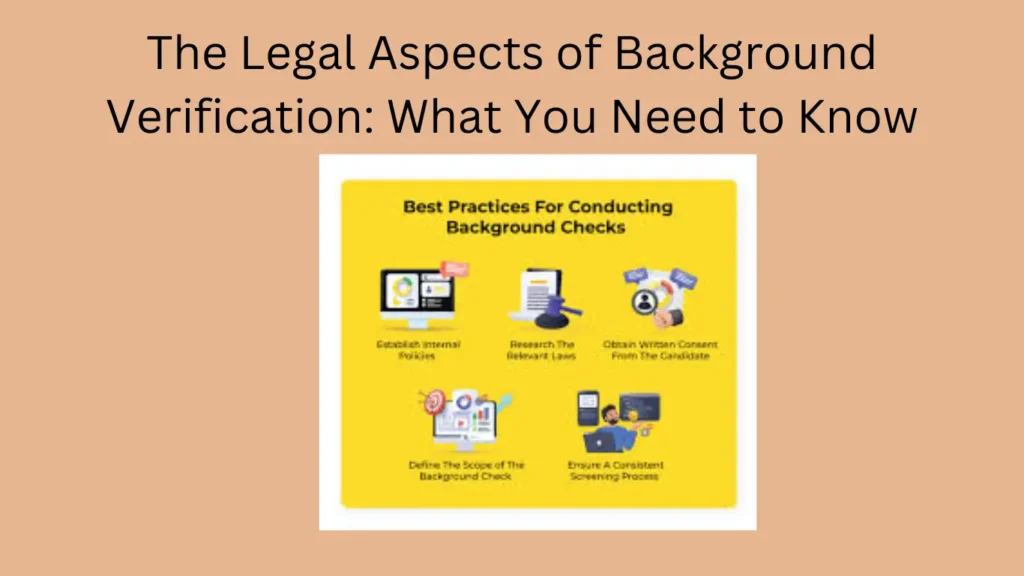Background verification is a critical step in the hiring process, but it must be conducted in compliance with various laws and regulations. Understanding the legal aspects of background verification is essential for employers to avoid legal liabilities and protect candidate rights. This guide explores key legal considerations, best practices, and compliance requirements to ensure a fair and lawful background screening process.
1. Legal Framework for Background Verification
Fair Credit Reporting Act (FCRA)
- The FCRA regulates the collection, dissemination, and use of consumer information, including background checks, for employment purposes.
- Employers must obtain written consent from candidates before conducting a background check and provide them with a copy of the report if adverse action is taken.
Equal Employment Opportunity Commission (EEOC) Guidelines
- EEOC guidelines prohibit discrimination based on protected characteristics such as race, color, religion, sex, national origin, age, disability, or genetic information.
- Employers should ensure that background checks are relevant to the job and do not disproportionately impact protected groups.
State and Local Laws
- Many states and local jurisdictions have additional requirements regarding background checks, such as ban-the-box laws, which restrict when and how employers can inquire about criminal history.
2. Best Practices for Legal Compliance
Written Policy
- Develop a written policy that outlines the types of background checks conducted, the process for obtaining consent, and the steps taken in the event of adverse action.
Consent and Disclosure
- Obtain written consent from candidates before conducting a background check and provide them with a clear and conspicuous disclosure of the nature and scope of the check.
Individualized Assessment
- Conduct an individualized assessment of any criminal history to determine its relevance to the job and consider factors such as the nature of the offense, the time elapsed, and the candidate’s rehabilitation efforts.
Adverse Action Process
- If adverse action is taken based on the background check, provide the candidate with a pre-adverse action notice, a copy of the background check report, and a summary of their rights under the FCRA.
- Allow the candidate a reasonable opportunity to dispute the accuracy or completeness of the report before taking final adverse action.
3. Compliance Challenges and Solutions
Ban-the-Box Laws
- Some states and localities have laws that restrict employers from asking about criminal history on job applications.
- To comply, delay inquiries about criminal history until later in the hiring process and ensure that any inquiries are job-related and consistent with business necessity.
Data Security
- Implement data security measures to protect the confidentiality and integrity of background check information.
- Ensure compliance with data protection regulations such as the General Data Protection Regulation (GDPR) or the California Consumer Privacy Act (CCPA).
International Considerations
- If conducting international background checks, comply with local data protection laws and consider using third-party providers with expertise in international screenings.
4. Conclusion
Navigating the legal landscape of background verification requires careful attention to detail and compliance with applicable laws and regulations. By understanding the legal framework, implementing best practices, and staying informed about compliance challenges, employers can conduct background checks responsibly and lawfully, ensuring a fair and equitable hiring process for all candidates.
For further Inquires Contact Us
FAQs
What is the Fair Credit Reporting Act (FCRA), and how does it relate to background verification?
- The FCRA regulates the collection, dissemination, and use of consumer information, including background checks, for employment purposes. Employers must obtain written consent before conducting a background check and provide candidates with a copy of the report if adverse action is taken.
What are EEOC guidelines, and how do they impact background verification?
- EEOC guidelines prohibit discrimination based on protected characteristics such as race, color, religion, sex, national origin, age, disability, or genetic information. Employers should ensure that background checks are relevant to the job and do not disproportionately impact protected groups.
What are ban-the-box laws, and how do they affect background checks?
- Ban-the-box laws restrict employers from asking about criminal history on job applications. To comply, delay inquiries about criminal history until later in the hiring process and ensure that any inquiries are job-related and consistent with business necessity.
How should employers handle adverse action based on background check results?
- If adverse action is taken based on the background check, provide the candidate with a pre-adverse action notice, a copy of the background check report, and a summary of their rights under the FCRA. Allow the candidate a reasonable opportunity to dispute the accuracy or completeness of the report before taking final adverse action.
What are the key challenges in international background checks, and how can employers address them?
- International background checks require compliance with local data protection laws and may involve additional challenges such as language barriers and cultural differences. Consider using third-party providers with expertise in international screenings and ensure compliance with relevant laws and regulations.
